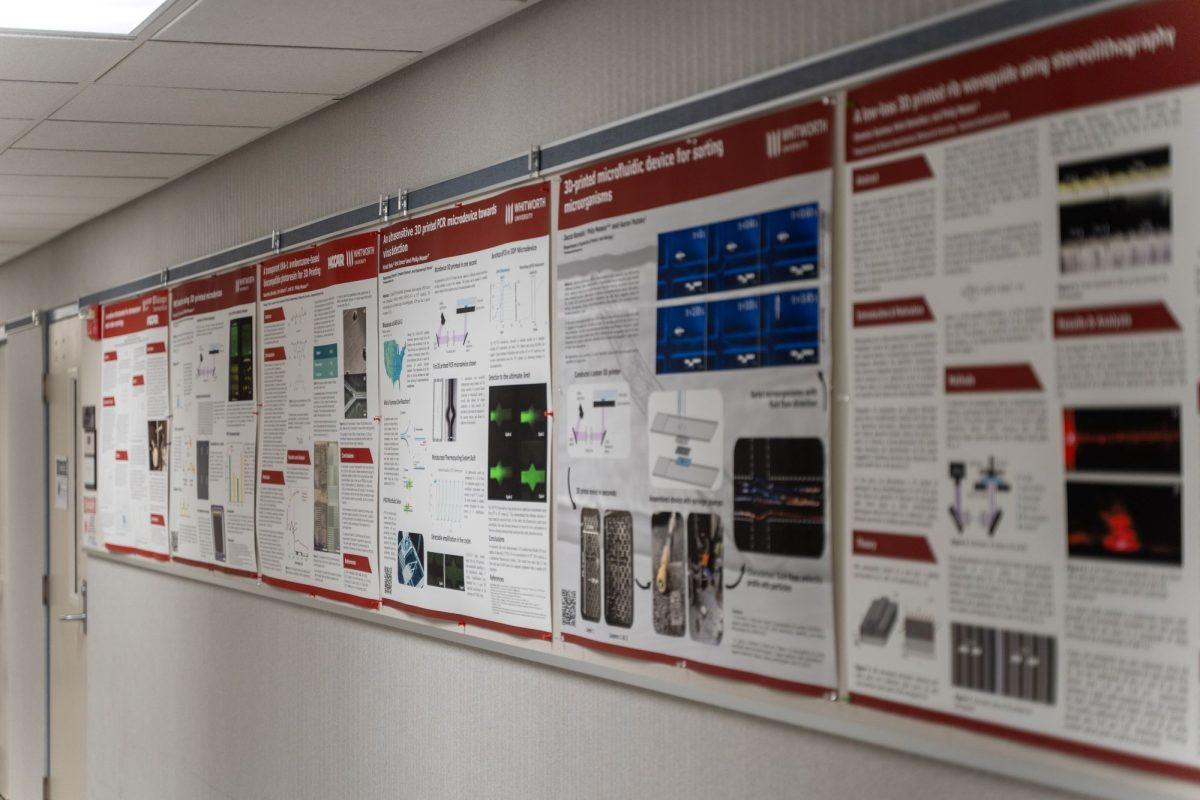College is a demanding beast.
It takes a student’s time, energy and guile. For a diploma, a four-year brawl with the beast is required. Yet some students begin the fight with a hand tied behind their back. Adults with Attention Deficit Hyperactivity Disorder (ADHD) who decide to tangle with the beast often struggle with seemingly impossible deadlines. Time and time again, ADHD students can’t keep up because their brains won’t slow down.
“One of the misnomers that you often hear about ADHD is that they have an inability to focus. If anything, it’s an inability to filter out distractions,” said Andrew Pyrc, director of educational support services at Whitworth University. “They want to try to focus on everything and take everything in. And that’s where the challenge lies.”
Students with ADHD shouldn’t feel they are doomed to fail. In fact, these students find themselves in the company of some of history’s finest statesmen, innovators, artists and scientists. Abraham Lincoln, Albert Einstein, Thomas Edison, Napoleon Bonaparte and Benjamin Franklin are all believed to have had some form of ADHD.
Today, ADHD affects nearly one out of every 20 American children, according to the U.S. National Library of Medicine.
Tyler McGinnis, a former Whitworth freshman, was diagnosed with ADHD in the first grade when his behavior became an issue in the classroom.
“I would just burst out in class, saying things and doing things really sporadically. No hesitation. I wouldn’t think about what I was doing,” McGinnis said.
Impulse control problems aren’t uncommon in young people with ADHD. However, the disorder has a different shape for everyone, and can vary greatly from one person to the next.
In the broadest sense, ADHD is a brain disorder characterized by hyperactivity, impulsiveness and difficulty maintaining attention. Studies have linked ADHD symptoms to a lack of norepinephrine (NE), a chemical in the brain that helps regulate awareness, according to Mayo Clinic.
NE shortages in different parts of the brain can lead to vastly different symptoms. A lack of NE in the limbic system, which handles emotions and memories, could cause emotional outbursts and problems remembering things. By contrast, not enough NE in the frontal cortex can lead to inattentiveness and problems with organizing.
People with ADHD usually lean toward the hyperactive-impulsive subtype, or the inattentive subtype (formerly known as attention deficit disorder, or ADD). Most people fall somewhere in the middle. There’s rarely a “typical” case of ADHD.
The symptoms may change with age, as they did with McGinnis. As he grew up, he “mellowed out,” and was no longer a distraction to his peers.
McGinnis describes himself as a good student, but he’s sometimes bored by the subject matter. If he’s genuinely interested in something, it’s difficult to pull him away. He says he has a tendency to focus on one thing and block out everything else. McGinnis admits he still struggles with managing his time well.
McGinnis was prescribed Adderall, a stimulant used to treat people with ADHD. McGinnis still takes Adderall twice a day. He takes it in the morning to get going, and then later in the afternoon to tackle his homework.
While ADHD is rooted in the brain’s biology, treatment requires both medicine and behavioral therapy, said Ryan Townsend, an advanced registered nurse practitioner at Eastern Washington University. Occasionally, Townsend receives referrals from Whitworth University if a student thinks he or she has ADHD, but isn’t certain. ADHD won’t show up in an x-ray or in a blood sample. To properly diagnose a student, Townsend has to rule everything else out.
“I think some people rush to judgment,” Townsend said.
When a child is acting dysfunctionally in school, Townsend said, some parents and physicians are quick to blame problems on ADHD without looking at the bigger picture.
“We have to look at the parenting, we have to look at the household, we have to look at the school. It’s not clean cut, ever,” Townsend said.
A daily regimen of medicine will only help a person with ADHD get so far, Townsend said.
“Therapy and medication seems to beat just medication, or just therapy,” Townsend said. “You’re going about multiple ways to treat a problem.”
Senior Chip Goodrich, another student with ADHD, said plenty of physical activity “helps keep him sane.” After his prescription medication led to mood swings and anxiety, he began to look for different approaches to manage his symptoms.
Goodrich said that Whitworth’s educational resources department was a large part of why he enrolled.
“I picked a smaller school because I knew I wouldn’t fall through the cracks,” Goodrich said. “I’m a slow reader, so it takes me a lot more time than most people to go through tests, or write out an essay where it’s coherent and concise and well-organized.”
With Pyrc’s assistance, he is now able to take exams in distraction-free environments, with extra time to gather his thoughts. Pyrc also worked with Goodrich to develop time management skills.
While Goodrich avoided seeking out accommodations for his ADHD in high school for fear of judgment, he advises other ADHD students to take ownership of their disorder.
“Try and understand where your shortcomings are with [ADHD], and accept them. If you feel people have labeled you in a certain way and that’s not the way you see yourself, don’t let other people define you,” Goodrich said. “Advocate for yourself.”
From Pyrc’s perspective, people with ADHD aren’t lesser than “normal” people. He said he believes it might not be a disorder at all. With treatment, Pyrc said that it’s possible to have ADHD and function normally without it getting in the way of their school work, relationships or everyday life.
“What’s better, a short story or a novel? They’re different, and they’re both good. There’s a place for both,” Pyrc said. “If it interferes and impacts you negatively, say in your work environment, then it’s a bad thing.”
Despite the difficulties Goodrich experiences because of ADHD, it also has an up side, he said.
“One of the beautiful things about ADHD is that it gives you such a different perspective a lot of the time. You’re able to think outside the box, turn something around, and look at a problem from a different angle” he said. “You have the ability to see connections where others don’t see any.
For Goodrich, ADHD is a blessing and a curse.
“You’re constantly able to see things differently, but you’re never able to stop thinking,” Goodrich said. “I literally cannot stop and clear my head. I don’t think I’ve ever been able to do that. It’s not possible. I’m always, always, always thinking.”
Contact Lucas Thayer at [email protected]





